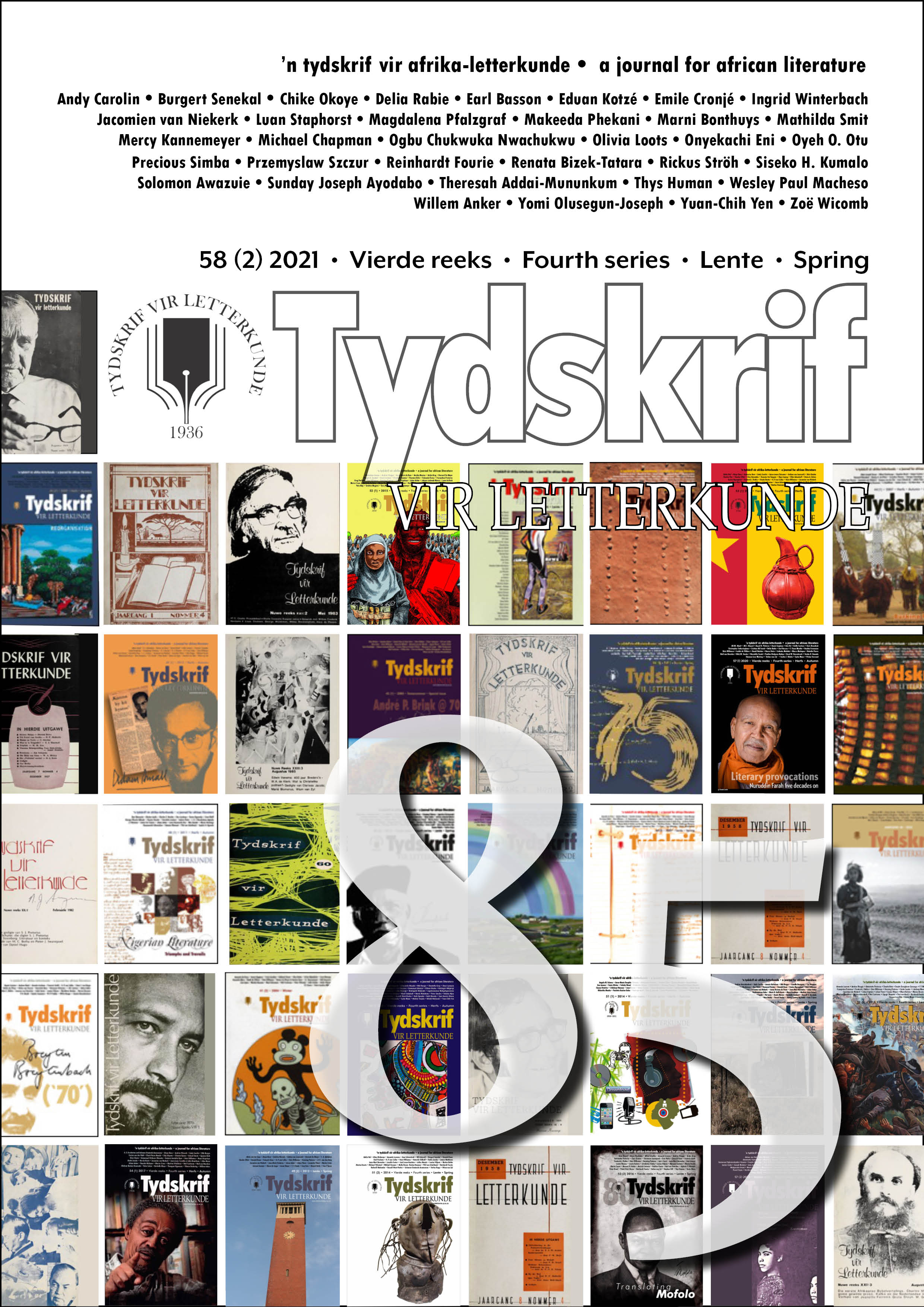Culture and Igbo notions of masculinity in Nigerian children’s literature
DOI:
https://doi.org/10.17159/tl.v58i2.8804Keywords:
oral traditions and culture, masculinity, Igbo masculinity, literature, gender, children’s literatureAbstract
Children’s literature conveys the cultural and indigenous artistic experiences of the people to whom it is attributed. Earlier studies on modern Nigerian children’s literature focus mainly on the representation of moral etiquette with little attention to gender. The twin theme of culture and masculinity has not been paid close attention by scholars of children’s literature in Nigeria. In applying Igbo notions of masculinity, in this article I examine the role of oral tradition and culture in the construction of masculine identity in children’s literature in Nigeria using Ifeanyi Ifoegbuna’s Folake and Her Four Brothers, Anthonia Ekpa’s Edidem Eyamba and the Edikang-Ikong Soup, and Ikechukwu Ebonogwu’s The Champion of Echidime. I show how the ideals of masculinity, as visible and permissible in the traditional Igbo society, are, in particular, constructed and communicated through various oral and cultural norms such as praise poetry, war songs and dance, wrestling, and drumming. I reveal that oral and cultural traditions in children’s literature reflect attributes such as strength, toughness, honour, protection, respect, heterosexual desirability, and the projection of self-pride as acceptable and embraced masculine values among the Igbo in Nigeria. I also demonstrate how oral and cultural tradition is replete with masculine ideologies and messages that promote male dominance in the Igbo society.
Downloads
References
Achebe, Chinua. Things Fall Apart. William Heinemann, 1958.
Akubue, Godwin B. Cow Without Tail. Dorrance, 2013.
Ayodabo, Sunday J. & Rowland C. Amaefula. “Continuity and Discontinuity: Masculinity and Power Blocs in African Cinema.” Quarterly Review of Film and Video, vol. 38, no. 7, 2021, pp. 654–75. DOI: https://doi.org/10.1080/10509208.2021.1876482.
Desch-Obi, Thomas J. Fighting for honor: The history of African martial art traditions in the Atlantic world. U of South Carolina P, 2008.
Diala-Ogamba, Blessing. “Folktales as African Children’s Literature: A Study of Archetypal Symbols in Selected Igbo Folktales.” ALT 33 Children’s Literature & Story-telling: African Literature Today, edited by Ernest Emenyonu. Boydell & Brewer, 2015, pp. 54–68.
Ebonogwu, Ikechukwu. The Champion of Echidime. Literamed, 2013.
Ekpa, Anthonia. Edidem Eyamba and the Edikang-Ikong Soup. Literamed, 2009.
Emenyonu, Ernest N. “Selection and Validation of Oral Materials for Children’s Literature: Artistic Resources in Chinua Achebe’s Fiction for Children.” Callaloo vol. 25, no. 2, 2002, pp. 584–96. DOI: https://doi.org/10.1353/cal.2002.0065.
Finnegan, Ruth. Oral Literature in Africa. Open Book, 2012.
Ifoegbuna, Ifeanyi. Folake and Her Four Brothers. Literamed, 2004.
Jeyifo, Biodun. “For Chinua Achebe: The resilience and the predicament of Obierika.” Kunapipi vol. 12, no. 2, 1990, p. 51–70.
Kiyimba, Abasi. “Gendering social destiny in the proverbs of the Baganda: Reflections on boys and girls becoming men and women.” Journal of African Cultural Studies vol. 17, no. 2, 2005, pp. 253–70. DOI: https://doi.org/10.1080/13696850500448360.
Kiyimba, Abasi. “Men and Power: Masculinity in the Folktales and Proverbs of the Baganda.” Masculinities in African Literary and Cultural Texts, edited by Helen Mugambi & Tuzyline Allan. Ayebia Clarke, 2010, pp. 35–49.
Mbah, Leonard N. “Emergent masculinities: The gendered struggle for power in southeastern Nigeria, 1850–1920.” Diss. Michigan State U, 2013.
Mfecane, Sakhumzi. “‘Ndiyindoda’ [I am a man]: theorising Xhosa masculinity.” Anthropology Southern Africa vol. 39, no. 3, 2016, pp. 204–14. DOI: http://dx.doi.org/10.1080/23323256.2016.1208535.
Mfecane, Sakhumzi. “Towards African-centred theories of masculinity.” Social Dynamics vol. 44, no. 2, 2018, pp. 291–305. DOI: https://doi.org/10.1080/02533952.2018.1481683.
Mugambi, Helen N. & Tuzyline J. Allan. Masculinities in African literary and cultural texts. Ayebia Clarke, 2010.
Nodelman, Perry. “Making boys appear: the masculinity of children’s fiction.” Ways of being male, edited by John Stephens. Routledge, 2002, pp. 1–14.
Odimegwu, Clifford, Saseendran Pallikadavath & Sunday Adedini. “The cost of being a man: social and health consequences of Igbo masculinity.” Culture, health & sexuality vol. 15, no. 2, 2013, pp. 219–34. DOI: http://dx.doi.org/10.1080/13691058.2012.747700.
Oha, Obododimma. “The semantics of female devaluation in Igbo proverbs.” African Study Monographs vol. 19, no. 2, 1998, pp. 87–102.
Ojaide, Tanure. “Deploying Masculinity in African Oral Poetic Performance: The Man in Udje.” Masculinities in African Literary and Cultural Texts, edited by Helen Mugambi & Tuzyline Allan. Ayebia Clarke, 2010, pp. 66–77.
Ojaide, Tanure. “Modern African literature and cultural identity.” African Studies Review vol. 35, no. 3, 1992, 43–57. DOI: https://doi.org/10.2307/525127.
Okpewho, Isidore. African Oral Literature: Background character and Continuity. Indiana U P, 1992.
Onunwa, Udobata. Studies in Igbo traditional religion. Pacific, 1990.
Omeje, Kenneth. “‘Enyimba Enyi’: The Comeback of Igbo Nationalism in Nigeria.” Review of African Political Economy vol. 32, no. 106, 2005, pp. 630–6.
Ouzgane, Lahoucine & Robert Morrell. African masculinities: Men in Africa from the late nineteenth century to the present. Springer, 2005.
Ratele, Kopano. “Analysing males in Africa: Certain useful elements in considering ruling masculinities.” African and Asian studies vol. 7, no. 4, 2008, pp. 515–36. DOI: https://doi.org/10.1163/156921008X359641.
Ratele, Kopano. “Hegemonic African masculinities and men’s heterosexual lives: Some uses for homophobia.” African Studies Review vol. 57, no. 2, 2014, pp. 115–30. DOI: https://doi.org/10.1017/asr.2014.50.
Sackeyfio, Rose. “Culture & Aesthetics in Selected Children’s Literature by Akachi Ezeigbo.” ALT 33 Children’s Literature & Story-telling: African Literature Today, edited by Ernest Emenyonu. Boydell & Brewer, 2015, pp. 6–16.
Turner, Noleen S. “Representations of masculinity in the contemporary oral praise poetry of Zulu men.” South African Journal of African Languages vol. 19, no. 3, 1999, pp. 196–203. DOI: https://doi.org/10.1080/02572117.1999.10587397.
Uko, Iniobong. “Contemporary Nigerian Children’s Literature: A Study of Ifeoma Onyefulu.” ALT 33 Children’s Literature & Story-telling: African Literature Today, edited by Ernest Emenyonu. Boydell & Brewer, 2015, pp. 17–30.
Published
Issue
Section
License
Copyright (c) 2021 Tydskrif vir Letterkunde

This work is licensed under a Creative Commons Attribution-ShareAlike 4.0 International License.


 https://orcid.org/0000-0001-6465-6584
https://orcid.org/0000-0001-6465-6584


.png)